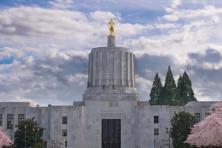Climate pollution from buildings: we know it’s a major problem, and we know how to stop it.
Buildings are one of the largest sources of climate pollution in Washington State. And the problem is getting worse. Pollution from buildings is growing more quickly than in other sectors, largely thanks to the use of fossil gas for heating. Burning fossil gas creates air pollutants both indoors and outside. and contributes to childhood asthma. We need to quickly transition our buildings onto clean electricity to meet our climate goals and to advance public health and equity. An important further challenge is: how do we transition in a way that protects customers?
With this new research, we explore how gas utilities can plan for the energy transition, cut climate pollution to zero, and protect low-income ratepayers. We specifically model the transition for Washington’s largest gas utility, Puget Sound Energy (PSE), and we evaluate different pathways PSE can take to reduce its climate pollution. We examine the impacts on customers when the energy transition is planned for in a managed way versus a scattershot way, and how these impacts will be especially felt on low-income ratepayers. Read our report to learn more about how we can plan for an energy transition with the best outcomes for both climate and customers.



